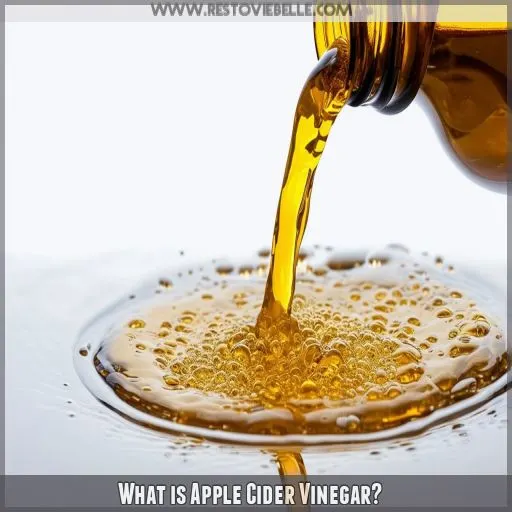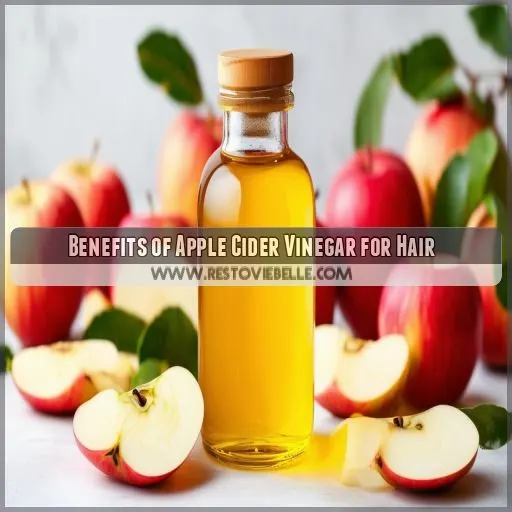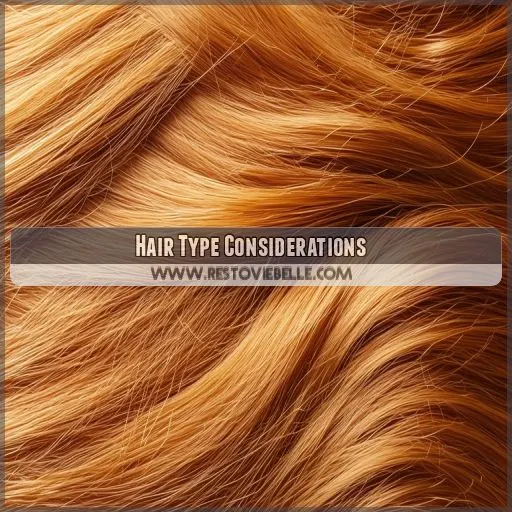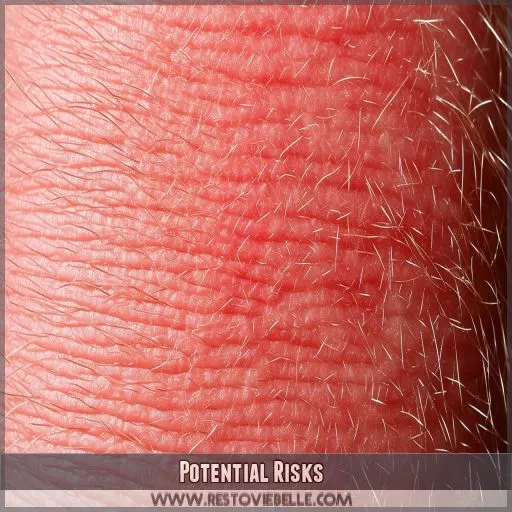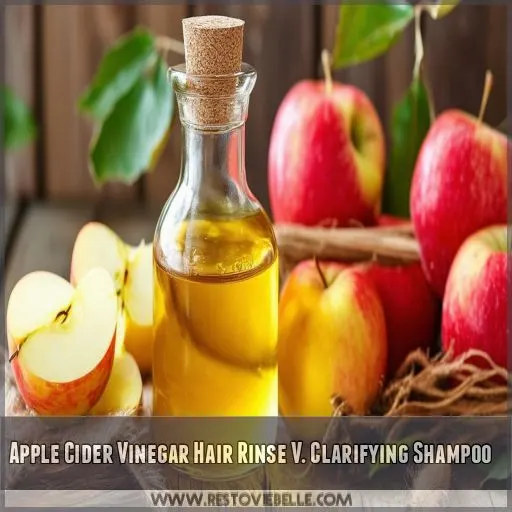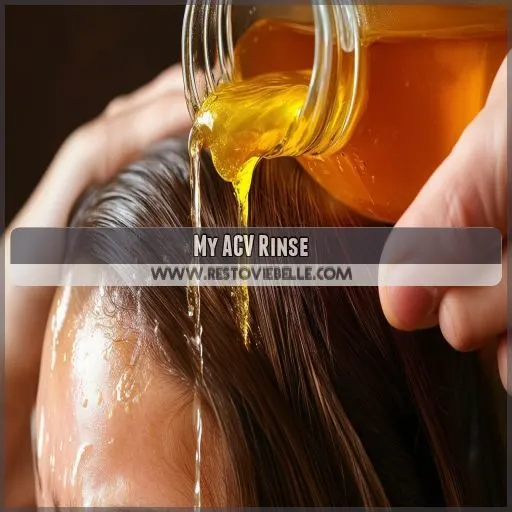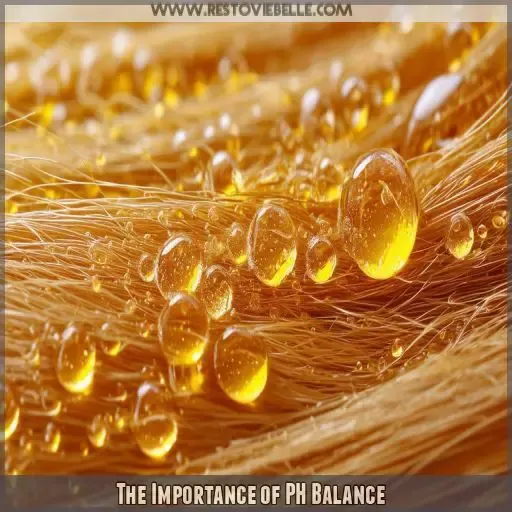This site is supported by our readers. We may earn a commission, at no cost to you, if you purchase through links.
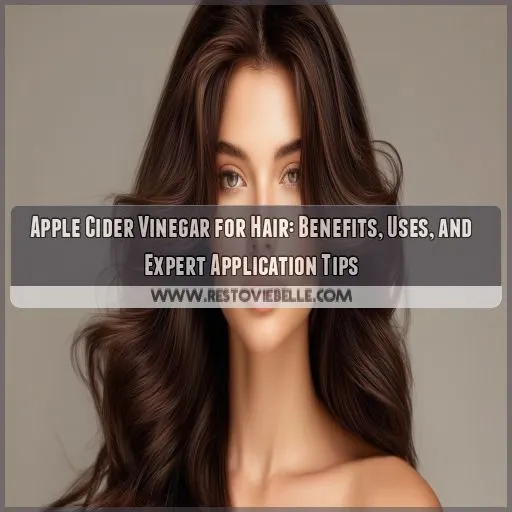 You will be surprised to learn that 62% of people are suffering from some scalp issues or another.
You will be surprised to learn that 62% of people are suffering from some scalp issues or another.
Know how to use apple cider vinegar for hair and deal with them most effectively. ACV assures several benefits, including restoring the scalp to health, strengthening the hair roots, and enhancing its shining glory.
Here’s a comprehensive guide about using apple cider vinegar—right from the proper dilution ratio to application methods—so you get the best out of this ingredient.
Change up your hair care regime with the natural goodness of ACV and get the hair you’ve always wanted.
Table Of Contents
- Key Takeaways
- What is Apple Cider Vinegar?
- Benefits of Apple Cider Vinegar for Hair
- Hair Type Considerations
- How to Use Apple Cider Vinegar for Hair
- Potential Risks
- Apple Cider Vinegar Hair Rinse V. Clarifying Shampoo
- My ACV Rinse
- The Importance of PH Balance
- Frequently Asked Questions (FAQs)
- Should I use apple cider vinegar before or after shampooing?
- Do you put apple cider vinegar on wet or dry hair?
- How often should I use apple cider vinegar on my hair?
- How to clarify your hair with apple cider vinegar?
- Can pregnant women use ACV for hair care?
- Does ACV help with hair loss?
- How should ACV be stored?
- Can I mix ACV with other hair products?
- Does ACV interact with medications?
- Conclusion
Key Takeaways
- Apple cider vinegar (ACV) is a kitchen staple with surprising benefits for your hair, including scalp healing, strengthening strands, and enhancing shine.
- ACV’s acidic nature helps balance hair’s pH, close cuticles, and combat frizz, leaving you with smoother, glossier locks.
- To use ACV for hair, mix 1 part ACV with 5 parts water and apply it to your scalp after shampooing. Leave it on for 5-10 minutes, then rinse thoroughly.
- Use ACV sparingly, as overuse can cause irritation. Start with once or twice a week and adjust based on your hair’s needs.
What is Apple Cider Vinegar?
Apple cider vinegar is a versatile liquid made from fermented apples. Its unique properties make it a popular ingredient in hair care routines.
With an acidic pH around 3, apple cider vinegar can help balance the hair’s natural pH, which typically ranges from 4.5 to 5.5. This pH-balancing effect is one of the key reasons why apple cider vinegar is touted for its potential benefits in promoting healthy, shiny, and manageable hair. Research suggests its antimicrobial qualities may also contribute to its effectiveness in hair care.
Benefits of Apple Cider Vinegar for Hair
Apple cider vinegar offers multiple benefits for your hair, including improved scalp health, strengthened strands, and enhanced shine. Its antimicrobial properties help combat scalp issues, while its pH-lowering ability balances hair health.
Scalp Health
Apple cider vinegar (ACV) can work wonders for your scalp health! It helps with:
- Scalp conditions
- Dandruff treatment
- Itchy scalp relief
- Balancing pH levels
- Removing product buildup
Hair Strength and Shine
Apple cider vinegar rinses can work wonders for your hair’s strength and shine. Rich in minerals, this natural ingredient helps balance your locks, leaving them healthier and more vibrant. Embrace the power of apple cider vinegar for hair strengthening and radiance.
| Benefits | Description | Evidence |
|---|---|---|
| Strengthens Hair | Apple cider vinegar contains minerals that fortify strands. | Clinical studies show it improves hair elasticity and reduces breakage. |
| Enhances Shine | The acidic pH of vinegar smooths the cuticle for lustrous shine. | User reports indicate it leaves hair more glossy and manageable. |
PH Balance
Apple cider vinegar’s acidity helps restore your hair’s natural pH balance, making it a powerful hair rinse. Unlike clarifying shampoos that can strip and dry out hair, this natural hair cleanser smoothes the cuticles, adding shine and softness to your locks.
Antimicrobial Properties
Apple cider vinegar’s antimicrobial properties help control fungal infections and dandruff. By improving overall scalp health, it enhances hair strength and shine. This home remedy is particularly effective for cuticles and kinky or type 4 hair, potentially reducing hair loss and maintaining luster.
Hair Type Considerations
If you struggle with dandruff or infrequent hair washing, apple cider vinegar can help balance your scalp’s pH and gently exfoliate. Its antimicrobial properties may also benefit those with scalp issues that require more frequent cleansing.
Dandruff and Infrequent Washing
When you skip frequent hair washing, acidic buildup can become a problem, leading to dandruff and scalp bacteria.
Apple cider vinegar’s antimicrobial properties make it a strong contender for dandruff relief. It helps to balance your scalp’s pH, ensuring the bacteria causing dandruff are kept in check.
Also, ACV’s gentle nature is good for those who wash their hair less often, offering a clean, refreshed scalp without stripping hair color. Knowing how to use apple cider vinegar for hair effectively can drastically reduce these issues.
Exfoliation and PH Balance
Another highlight of using apple cider vinegar (ACV) for your hair care is that it exfoliates. Exfoliation with ACV aids in removing dead skin cells, clearing the clogged pores on the scalp—resulting in good scalp health and setting a base for great hair growth.
In this case, the acidity of vinegar plays a vital role in restoring the pH level of the scalp. Therefore, ACV restores the pH, which closes the cuticles and enhances shine and smoothness.
Keeping your hair between the optimal pH ranges of 4.5-5.5 will make it more resistant, lively, and neither too oily nor dry.
How to Use Apple Cider Vinegar for Hair
To use apple cider vinegar for hair, mix one part ACV to five parts water, then spray or pour the mixture onto your scalp, massaging it in gently. Let it sit for 5-10 minutes before rinsing thoroughly with cool water.
Proper Dilution and Application
To use apple cider vinegar for hair correctly, mix a part of ACV with five parts water. This makes the solution gentle yet potent.
Apply it all over the place on your scalp by spraying it so that most areas are covered. Massage your scalp using your fingers and stimulate blood flow gently. Let this solution go in deep. The method helps balance the pH and fights bacteria.
Adjust the frequency based on your hair type, but generally limit use to once or twice weekly. For sensitive scalps, start with a more diluted solution.
Duration of Application and Rinsing
Apply the apple cider vinegar to your hair properly in order to utilize it best.
After mixing, spread the solution of ACV all over your scalp and through your hair, gently massaging with your fingers. Let it stay for some time, about 5-10 minutes, sometimes even deciding on the amount of time balancing the pH of your locks or fighting any microbial problems.
Follow up by rinsing with cool water and then styling like usual. This application ensures effectiveness without over-drying.
Adjust your diluting ratios accordingly to suit hair texture, and remember to lock in moisture as part of your post-rinse care by conditioning.
Potential Risks
Using apple cider vinegar for hair care comes with some potential risks, such as irritation and an unpleasant smell. To avoid issues, always dilute the vinegar properly and limit use to a couple of times a week.
Irritation and Unpleasant Smell
While apple cider vinegar can work wonders for your hair, it’s important to use it sparingly. The acidic nature of ACV can cause irritation if not diluted properly.
You may also notice an unpleasant vinegar-like odor after application. To avoid these issues, be sure to dilute your ACV mixture with plenty of water before pouring it over your scalp and hair.
Start with a ratio of 1 part ACV to 5 parts water and adjust as needed. With the right dilution, you can enjoy the benefits of ACV without any unwanted side effects.
Frequency and Proper Dilution
When using apple cider vinegar for your hair, make sure it’s appropriately diluted so that it doesn’t irritate the skin. For that matter, use 1 part ACV with 5 parts water.
If used too much, it can cause dryness; hence apply it twice a week. Stop if any irritation you notice. The smell of vinegar may be off-putting to some people, but the odor is gone after the rinse.
For convenience and to make sure it’s safe, consider commercial products pre-mixed. Keep in mind that hair type and scalp sensitivity are individual, so start slowly to see the results on your own skin.
Apple Cider Vinegar Hair Rinse V. Clarifying Shampoo
While both apple cider vinegar rinses and clarifying shampoos can remove buildup and cleanse your scalp, ACV rinses enhance shine and seal in hair color. Clarifying shampoos, however, can sometimes fade color and dry out your hair; use each based on your hair type and needs.
Benefits and Differences
Choosing between apple cider vinegar (ACV) hair rinse and clarifying shampoo depends on your needs. ACV rinse offers several benefits:
- Seals in Hair Color: Unlike shampoos that may fade your color.
- Enhances Shine: Adds luster by closing the hair cuticles.
- Maintains PH Balance: Keeps your scalp’s pH in check.
- Gentler: Less harsh than clarifying shampoos that can strip natural oils.
- Natural Antimicrobial Properties: Helps control bacteria and fungi.
Consider your hair type and desired outcomes before making your choice.
Frequency Based on Hair Type
Determining the frequency for using an apple cider vinegar rinse versus a clarifying shampoo depends on your hair type.
| Hair Type | ACV Rinse Frequency | Clarifying Shampoo Frequency |
|---|---|---|
| Fine or Oily Hair | Once a week | Once every two weeks |
| Dry or Curly Hair | Every other week | Once a month |
| Color-Treated Hair | Every two weeks | Once a month |
ACV rinses can help maintain shine and reduce buildup without stripping natural oils, while clarifying shampoos offer a deeper cleanse but may cause dryness if overused.
My ACV Rinse
When trying out an ACV rinse, you’ll likely notice changes in hair texture and shine almost immediately. To get the best results, follow recommended dilution guidelines and monitor your hair’s reaction closely.
User Experience and Effects
Now, to share my experience with an ACV rinse: I tried this DIY apple cider vinegar hair rinse to see if it would live up to all the hype. Here’s how it went:
Mix 2 tablespoons of this ACV with 8 ounces of water, as recommended, for a post-shampoo hair rinse. Leave it on for some minutes before washing. I could feel my hair getting softer and see it shining right after the very first application. I’ve been using it once a week since the last month; here are the key takeaways:
- Clearly delivers on its promise of enhancing shine. My hair looks healthier and more vibrant.
- My head has generally been itchy, but the itchiness isn’t as bad since I started using the ACV rinse.
- I’ve wavy hair, and for me, this ACV rinse helps a lot in managing my hair and having it sit how I want it to.
Tips for Usage
When applying your ACV rinse, start by diluting the vinegar with water in a 1:3 ratio. This gentle dilution will help prevent irritation while still delivering the benefits to your scalp and hair. Massage the mixture into your scalp, focusing on any problem areas. Let it sit for 5-10 minutes before rinsing thoroughly with cool water. For an extra boost, consider adding a few drops of your favorite essential oil – lavender or rosemary work great to soothe the scalp and seal the hair cuticles. With a little experimentation, you’ll find the perfect ACV rinse routine for your hair health.
| Dilution Ratio | Application Time | Rinse Temperature | Essential Oils | Hair Benefits |
|---|---|---|---|---|
| 1 part ACV : 3 parts water | 5-10 minutes | Cool water | Lavender, Rosemary | Scalp soothing, cuticle sealing |
| 1 part ACV : 4 parts water | 3-5 minutes | Lukewarm water | Peppermint, Tea Tree | Antimicrobial, stimulating |
| 1 part ACV : 5 parts water | 10-15 minutes | Warm water | Ylang-Ylang, Geranium | Moisturizing, balancing |
| 1 part ACV : 6 parts water | 15-20 minutes | Cold water | Cedarwood, Clary Sage | Clarifying, volumizing |
| 1 part ACV : 7 parts water | 20-30 minutes | Alternating hot/cold | Bergamot, Frankincense | Rejuvenating, strengthening |
The Importance of PH Balance
Your hair’s pH balance is crucial for maintaining health and vitality. Apple cider vinegar, being acidic, helps close the hair cuticles, which can lock in moisture and enhance shine.
Acidic Nature of ACV
ACV’s acidity is key to its effectiveness in hair care. Understanding its composition and how it interacts with your hair’s chemistry can help you maximize its benefits. ACV has a pH of around 3, which makes it acidic. This acidity can provide several benefits:
- Balancing Hair pH: ACV helps balance the pH of your scalp.
- Combatting Buildup: It can break down product buildup efficiently.
- Taming Frizz: Its acidity smooths down the hair cuticle.
- Promoting Shine: Regular use may enhance your hair’s natural shine.
Consider your skin sensitivity before using ACV.
Effects on Hair Cuticles
Apple cider vinegar is good for hair because of its acidic nature. When used, the ACV provides a low pH to your hair, which locks in moisture by closing and flattening your cuticles. This process smoothes the texture of the hair, increasing its shine.
The acid pH also supports the tender acid-base balance required by your hair to be healthy. Without this balance, your strands can become dry, brittle, and easily damaged. By restoring your hair’s optimal pH, ACV rinses help to lock in hydration and keep your locks looking their best.
Harness the power of this versatile vinegar for beautiful and manageable hair.
Frequently Asked Questions (FAQs)
Should I use apple cider vinegar before or after shampooing?
Apply apple cider vinegar after shampooing. This allows the ACV to remove any remaining buildup, balance your scalp’s pH, and enhance shine. After rinsing out the vinegar, condition your hair as usual.
Do you put apple cider vinegar on wet or dry hair?
Pour apple cider vinegar on wet hair. Working it through damp hair makes it absorb and work better to lower the pH. Dilute well, and apply after shampooing when one’s hair is clean for optimal results. Be cautious not to overuse, as this can cause irritation.
How often should I use apple cider vinegar on my hair?
You should use apple cider vinegar on your hair a maximum of twice a week. Overuse can lead to irritation and dryness, so it’s best to start gradually and monitor your hair’s response.
How to clarify your hair with apple cider vinegar?
To clarify your hair with apple cider vinegar, simply mix 1 part vinegar with 5 parts water, apply to your scalp, let it sit for 5-10 minutes, then rinse thoroughly. This gentle cleanse removes buildup and restores shine.
Can pregnant women use ACV for hair care?
Yes, apple cider vinegar can be used for hair care during pregnancy. The concentration should be appropriate, and look out for irritation. Generally, it’s safe, but seek advice from your health provider to support specific recommendations.
Does ACV help with hair loss?
A stitch in time saves nine." While apple cider vinegar can improve scalp health and strength, there’s no concrete evidence it prevents hair loss. It’s best to use it as a supplement, not a standalone solution.
How should ACV be stored?
To store apple cider vinegar for hair, keep it in a cool, dark place like the pantry. The vinegar should be kept tightly sealed to prevent oxidation and maintain its potency. Refrigeration is optional but not necessary.
Can I mix ACV with other hair products?
Mix ACV with other hair products if you wish, but make sure to always dilute it enough and avoid mixing with harsh chemical products so that irritation isn’t present and the natural balance of hair is maintained.
Does ACV interact with medications?
Apple cider vinegar generally doesn’t interact with medications when used topically for hair. However, if you have any concerns, especially related to scalp conditions or allergies, it’s best to consult with your healthcare provider.
Conclusion
What is most interesting, however, is the fact that very few people are aware of the immense benefits that can be derived with the use of apple cider vinegar for hair.
If you know how to use apple cider vinegar for hair, you’ll have good scalp health by having strengthened your hair and making it shiny. Be sure only to use the correct dilution ratios and top tips for application.
With its inherent nature, ACV can be that magic ingredient in getting healthier as well as more vivacious locks of hair. Give it a try, and experience the transformation yourself.

